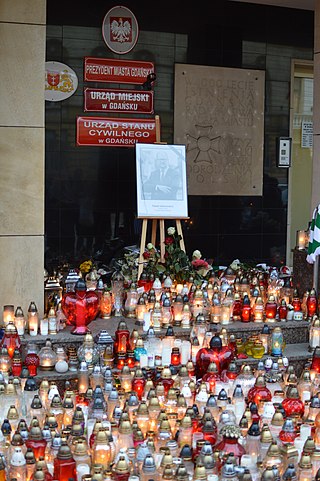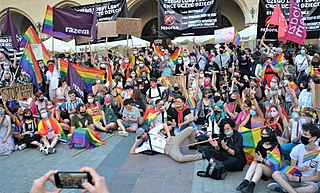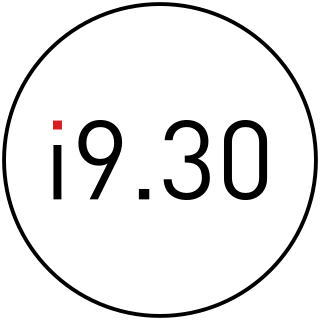The mass media in Poland consist of several different types of communications media including television, radio, cinema, newspapers, magazines, and Internet.

Telewizja Polska S.A., also known in English as Polish Television, is a public service broadcaster in Poland, founded in 1952. It is the oldest and largest Polish television network.
Disco polo is a genre of popular dance music, created in Poland in the 1980s. It was initially known as sidewalk music or backyard music. This genre, a type of Polish urban folk music, had great popularity in the 1990s, peaking in 1995–1997, then gradually declining in popularity through the early 21st century. The genre then had a resurgence in the winter of 2007. The Polish PWN dictionary defines the genre as a Polish variant of disco music, with simple melodies and often ribald lyrics.

TVN24 is a Polish 24-hour commercial news channel, launched on 9 August 2001. Being a part of the TVN Network, TVN24 has been owned since 2018 by US-based media company Warner Bros. Discovery. It gained broader popularity after the September 11, 2001 attacks in the US, which was the first major incident to be covered by TVN24. It is available over all digital platforms in Poland as well as in most cable networks and some networks in other countries, including USA and Germany. The audio portion of the channel can be streamed on the internet.
TVP Info is a Polish free-to-air television news channel, run by the public state broadcaster TVP. It is focused on newscasts, mainly broadcasting nationwide news bulletins. Until 20 December 2023, its main offices were located in the Television Information Agency building at Warsaw Insurgents Square; since 29 December 2023 the channel's activities are carried out from the main TVP building on Woronicza Street, Warsaw.
Television in Poland was introduced on an experimental basis in 1937. It was state owned, and was interrupted by the Second World War in 1939. Television returned to Poland in 1952 and for several decades was controlled by the communist government. Colour television was introduced in Poland in 1971. Private television stations in Poland appeared around the time of the fall of communism, with PTV Echo becoming the first private station in Poland.

Presidential elections were held in Poland on 28 June 2020. As no candidate received a majority of the vote, a second round was held on 12 July, in which incumbent president Andrzej Duda, running with the support of Law and Justice, faced off against Civic Platform vice-chairman and Mayor of Warsaw Rafał Trzaskowski. In the second round Duda was re-elected for a second term with 51% of the vote, becoming the first incumbent to win re-election since Aleksander Kwaśniewski in 2000.

Beata Edyta Tadla is a Polish radio and TV journalist and TV presenter.

Zuzanna Irena Grabowska, known professionally as sanah, is a Polish singer, songwriter, violinist, and composer. She received nationwide popularity in 2020, with the release of her single "Szampan", which became a number one hit in Poland. She later released her debut studio album Królowa dram (2020), which peaked at number one in Poland. She has gone on to release three further studio albums: Irenka (2021), Uczta (2022), and Sanah śpiewa poezyje (2022), all of which peaked at number one in Poland, and were certified diamond by the Polish Society of the Phonographic Industry. She released her fifth studio album Kaprysy on 14 June 2024.

Paweł Adamowicz, sitting mayor of Gdańsk, Poland, was fatally stabbed on 13 January 2019, during the finale of the 27th Great Orchestra of Christmas Charity, a wintertime Polish charity event. The incident took place in the former coal market of the city of Gdańsk. It was a highly public attack, with significant news coverage from both national and international sources.

Stop Bullshit was a queer anarchist collective in Warsaw with the goal of fighting homophobia and transphobia, founded in May 2019 by Małgorzata "Margot" Szutowicz and Zuzanna "Łania" Madej, opposing the actions of the Pro Foundation.

Piotr Kraśko is a Polish journalist, theatrologist and television presenter. Between 1991 and 2016 he worked for the Telewizja Polska and since 2016 for the TVN channel.
Robert David Gamble is an American businessman and Episcopal priest, a great-grandson of James Gamble. Between 1980 and 1992, he was a hospital chaplain in Boston. In 1984, he started being engaged in the movement of Alcoholics Anonymous in Poland. In 1991 or 1992, he co-founded Radio Obywatelskie. In 1992, he co-founded Media Rodzina. In 1999, he received the Order of Merit of the Republic of Poland. Between 2005 and 2014, he was the pastor of the Anglican Church in Poland. In 2014, he received a title of a titular pastor of this parish from the Bishop in Europe. He used to organize a Christmas Eve for the solitary people in Poznań. In 2016, he received the Title of Merit of the City of Poznań. He published a Polish version of Harry Potter and the Philosopher's Stone, an autobiography of Barack Obama, and Promise Me, Dad. Both in the case of Barack Obama and Joe Biden, he published their books before they became a President of the United States.

Tomasz Knapik was a Polish film, radio and television voice-over translation artist. He held a doctorate in electrical engineering and also served as a lecturer at the Faculty of Transport of the Warsaw University of Technology. He was widely regarded as a legend in the field of voice-over translation in Poland.
Anita Gargas Wojciechowska is a Polish journalist specialising in investigative journalism and a mathematician by education. She is a journalist of the weekly Gazeta Polska and the daily Gazeta Polska Codziennie, where she is the head of the investigative section. From 1 August 2006 to 19 February 2010, she was a deputy director of the news desk and the vice-director for journalism at TVP1, and the author of the programme Misja specjalna.

Bartosz Gelner is a Polish actor best known for his roles in the films Suicide Room (2011) and Floating Skyscrapers (2013), as well as the television series Ultraviolet (2017–19) and Sexify (2021–23).

On December 19, 2023, Bartłomiej Sienkiewicz, the Minister of Culture and National Heritage in Poland, dismissed the then-current state media directors and their supervisory boards, most notably those of public broadcaster Telewizja Polska (TVP), appointing new ones in their place. The move was met with criticism and accusations of illegality by the dismissed management and the opposition Law and Justice (PiS) party, causing a parliamentary intervention in the TVP headquarters.

19.30 is the main Polish television news program produced by Telewizja Polska (TVP) and broadcast on TVP1, TVP Polonia, TVP Info and TVP Wilno. The main edition is transmitted daily at 7:30 p.m. It premiered on December 21, 2023 and succeeded Wiadomości, which was canceled following the management changes at TVP days before.

Telewizja Republika or TV Republika is a Polish television station, whose editor-in-chief is Tomasz Sakiewicz. The channel can be received via satellite, via the Internet and terrestrial in the DVB-T system, as well as in the DVB-T2 system. From 2022, the channel broadcasts its program 24 hours a day. The live portion of its output in Polish is broadcast every day for 16 hours, from 7:00 a.m. to 11:00 p.m., while between 11:00 p.m. and midnight, the programs of the English-speaking editorial staff of the channel are broadcast.
Akson Studio is Polish film and television production company founded by Michał Kwieciński. Since 1992, it has produced over 100 films and television series, including Katyń by Andrzej Wajda (2007) and Warsaw 44 by Jan Komasa (2014).












